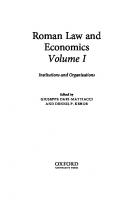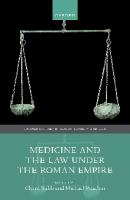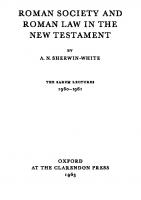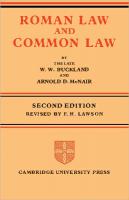Studies in Roman Government and Law
295 96 5MB
English Pages [230] Year 1960
The Imperium of Augustus --
The censorial powers of Augustus --
The elections under Augustus --
'I appeal unto Caesar' --
Imperial and senatorial jurisdiction in the early Principate --
The aerarium and the fiscus --
Procurators and prefects in the early Principate --
The dediticii and the Constitutio Antoniniana --
'In eo solo dominivm popvli Romani est vel Caesaris' --
The Roman civil service (clerical and subclerical grades).
Recommend Papers

- Author / Uploaded
- Arnold Hugh Martin Jones
File loading please wait...
Citation preview
Studies in
ROMAN GOVEJRNMENT AND LAW By A. H. M. JONES Professor of Ancient History in the University of Cambridge
BASIL BLACKWELL OXFORD 1960
S
PREFACE
EVEN of the articles contained in this book have been previously published elsewhere; I have made a few alterations and additions where new evidence has confirmed or modified my views, or for the sake of consistency or completeness. Two, the second and seventh, are new, and another, the eighth, is substantially new, being a radical revision of what I wrote in the Journal of Roman Studies, XXVI (1936), pp. 223-35. They have been assembled because they have a certain unity in that they are all concerned with the constitutional law and practice of the Roman Empire, and all endeavour to trace the continuity of the institutions of the late Republic with those of the Principate. The first two deal with the basic constitutional powers of Augustus and their Republican precedents, the third with the modification of the old electoral system under the new regime. The fourth and fifth trace the evolution ofjurisdiction from the Republican to the Imperial system. The sixth and seventh deal similarly with the development of the financial system and provincial administration. The eighth and ninth· treat the legal status of the provincials and of provincial land during both periods. The last traces the evolution of the civil service from the Republic to the age ofJustinian. I have to thank the editors of Studies presented to David Moore Robinson and the editors of Historia for allowing me to republish the fourth and fifth articles in this book. I owe a particular debt of gratitude to the Roman Society for permission to reproduce no less than five articles (the first, third, sixth, ninth and tenth in this book) published in the Journal of Roman Studies. Finally I must thank Sir Basil Blackwell for once again venturing to republish articles of mine. A. H. M. JONES Jesus College CAMBRIDGE
October, 1959
V
CONTENTS Pages
I. THE IMPERIUM OF AUGUSTUS
.
Uournal of Roman Studies, XLI
1-17
pp. 112-
(1951),
19)
II. THE CENSORIAL POWERS OF AUGUSTUS
19-26
III. THE ELECTIONS UNDER AUGUSTUS
Uournal of Roman Studies, XLV
(1955),
pp.
9-
21)
IV. 'I APPEAL UNTO CAESAR'
51-65
(Studies presented to David Moore Robinson, II, pp. 918-30) V. IMPERIAL AND SENATORIAL JURISDICTION IN THE
EARLY PRINCIPATE
.
(Historia,
pp.
III (1955),
67-98 464-88)
VI. THE AERARIUM AND THE Fiscus
LJournal of Roman Studies, XL
VII. PROCURATORS PRINCIPATE VIII. THE
AND
PREFECTS
99-114
(1950), IN
pp. 22-9)
THE
EARLY I 15-125
.
DEmncrr AND THE CoNsTITUTIO 127-140
ANTONINIANA IX. 'IN EO SOLO DOMINIVM POPVLI ROMANI EST VEL
141--149
CAEsArus'
LJournal of Roman Studies, pp. 26-31) vu
XXXI
(1941),
CONTENTS
Vlll
I
--J
X.
Pages THE ROMAN CIVIL SERVICE (CLERICAL AND SUB-
NOTES
CLERICAL GRADES)
Journal of Roman Studies, XXXIX (1949), pp. 38-55)
INDEX OF
pASSAGES
GENERAL INDEX
CITED
151-175 177-216
217-239
241-243
THE IMPERIUM OF AUGUSTUS
B
T
The Imperium of Augustus
HERE has been a tendency among some modem scholars to regard the constitutional position of Augustus as of negligible importance. This is a natural reaction from the excessive legalism of Mommsen and his school, and has had valuable results in elucidating extra-constitutional elements in the position of the first Princeps, such as his outstanding auctoritas and his huge clientela. I do not think however that we can lightly brush aside the constitutional basis of his power. I do not wish to suggest that the restored Republic was intended to be genuine, or even that Augustus meant to share his power with the Senate and People: never for one moment did he part with his control over the great bulk of the legions. But I would suggest he would not have created the elaborate fa c;:ade of Republican legitimacy, and moreover have subjected his original scheme to at least one radical revision, unless there had been some important element in the State to which the constitution mattered, and mattered so profoundly that its dissatisfaction would endanger the stability of the regime. This element was not, I think, primarily the nobility. They were too hard boiled to be put off by Augustus' sham Republic, and it was not the Republic that they so much lamented as their lost power. Moreover they had been decimated in the Civil Wars, and Augustus never trusted what was left of them: they did not hold high military commands as his legati. For them the restored Republic only meant that they could without loss of self respect hold office under the new regime and thus maintain their ancestral dignity. Nor do I think that it was the Roman People, if by this is meant the plebs urbana: the events of Augustus' reign prove that they wanted a popular dictatorship like Caesar's, 3
4
I. THE IMPERIUM
and from time to time they broke out, demanding that Augustus accept a life-long consulship or dictatorship. Nor was it the rank and file of the army, who followed him because he was Caesar's son, and were to continue for generations to give blind allegiance to any Caesar, even a Nero. Who then were the republicans? The greatest republican constitutionalist of the last days of the Republic was Cicero, a new man from an Italian town. Velleius Paterculus, the enthusiastic panegyrist of the restored Republic, came from an Italian family enfranchised in the Social War. Livy, the Pompeian historian, who glorified the stern fathers of the Republic, came from Padua. If we look a little later, Thrasea Paetus and his fellow admirers of Brutus and Cassius were worthy bourgeois from the tnunicipia et coloniae, and Tacitus himself came from the same milieu. It was, I think, the great Italian middle class, most of whom were Roman citizens of the third generation only, who venerated the republican traditions of Rome. And they were important politically; for from them were drawn the centurions and equestrian officers of the army, and picked men from among them were promoted to the Senate and held the higher army commands, in so far as these were not monopolised by the imperial family. Finally they were quite content with the form of the Republic, for their republicanism was sentimental and anti quarian: they had never tasted power under the old regime and had rarely even aspired to do so. To tum to the events. In 27 B.C., having purged the Senate, Imperator Caesar restored the Republic with a great flourish of trumpets and was rewarded with the cognomen of Augustus by -the grateful Senate. The legal powers enjoyed by the Princeps at this moment were somewhat limited. He possessed the sacro sanctity of a tribune, granted in 36 B.C. , and the tribunician power of auxilium, conferred in 30 B.C. He was moreover one of the \ consuls of the year. Of what happened next we have only Dio' s account, and according to him Augustus was voted a number of provinces for ten years. These provinces Dio enumerates according to their later boundaries: in 27 B.C. they could have
OF AUGUSTUS
s
been summed up as Hither Spain, Transalpine Gaul, Syria, and Egypt.1 L I Ii ) I l I � It has been argued ad nauseam whether Augustus' imperium at his stage was consular or proconsular. I do not believe that the � question arose. Augustus was consul, and the Senate assigned him provincia: no grant of imperium was required, for, to quote Appius Claudius Pulcher, speaking as consul, about to depart for his province at the end of 54 B.C., 'se quoniam ex senatus consulto provinciam haberet lege Cornelia imperium habiturum quoad in urbem introisset.' 2 It is true that the Lex Pompeia de provinciis had since then modified the position by inserting a five years' interval between magistracy and promagistracy, but this law had evidently either been abrogated or fallen in abeyance before 27 B.C., since Augustus either re-enacted or revived it in that year.3 The revival of the Lex Pompeia would naturally have come after the assignment of Augustus' province, which, as an extra ordinary command, would in any case have been (and of course was) exempted from its provisions. The grant of the provinces must have included the right to appoint numerous legati, which Pompey and Caesar had received before. It was probably at this date also that Augustus was given the right to declare war andj make treaties which is mentioned by Strabo and by the Lex de imperio Vespasiani.4 There were Republican precedents for this in the LexManilia and the Lex Trebonia5 and it was a not unnatural privilege for the magistrate who was to control most of the frontiers for the next ten years; it also incidentally gave Augustus control over the numerous and powerful kings of the Empire. Though this right proved to be lifelong as Strabo describes it, I think that it was probably originally linked with the provincia, as in the cases of Pompey and of Crassus. We tend, I think, knowing what did happen next, to assume too readily that it was an open secret at the time that Augustus was going to be consul year after year. Dio, for what he is worth, represents the majority of the Senate as being in the dark, 6 and if this is true many of them may have hoped and expected that
I. THE IMPERIUM
6
Augustus would, like Caesar in 59, go and govern his provinces, 1 \ or at the worst, like Pompey in 55, hang about in Italy as pro / consul, governing his provinces through his legates. But if so disappointed; for Augustus stood for, and was naturally 1 they were elected to, the consulship in 26, and again in 25, and in 24, and \ . ill
23.
He thus placed himself in a position which could hardly be called republican. The only recent precedent for a continuous series of consulships was Marius, hardly a reputable figure. Moreover, in addition to ruling the great provincia which the Senate had assigned to him, he possessed the vast and undefmed powers of a consul, which he could stretch to include an ultimate �control over all proconsuls; for according to that excellent 1republican jurist, Cicero, 'omnes in consulis iure et imperio debent i..,.esse provinciae' and to the consuls 'more maiorum concessum est vel omnes adire provincias'. 7 That Augustus (conjointly with his fellow consul) used this prerogative is proved by a recently published inscription: it records a decree of Augustus and Agrippa, consuls (that is in 27 B.c.), ordering the restitution of sacred property in the provinces, and a consequential judgment of the proconsul of Asia, who refers to it as iussu Augusti Caesaris. 8 The incident of Primus, proconsul of Macedonia, charged with making war on the Odrysae without authorisation, proves that Augustus was suspected of ordering proconsuls about in more important matters; for Primus claimed in defence that he had acted on Augustus' orders, and when Augustus, questioned by the praetor, denied this, Primus' counsel Murena asked him what he was doing in court in that case, implying that he doubted his word.9 And Augustus, besides interfering with other proconsuls, was from time to time in Rome, where as consul he could domi nate the Senate. Matters were made worse by the too obvious parade of Marcellus as heir apparent, which suggested a hereditary tyranny: Primus at his trial exploited this suspicio!} by claiming that Marcellus had given him instructions, and Augustus after Marcellus' death thought it prudent to offer to publish his will to
OF AUGUSTUS
7
prove that he had no intention of founding a hereditary monarchy.1 0 That this state of affairs caused bitter dissatisfaction is proved by ) the conspiracy of Caepio and Murena, misplaced by Dio in 22, / really belonging to the previous year: 11 this conspiracy was all the more serious in that Murena was what Velleius calls a good man, that is a Caesarian, and it must have been a sharp reminder to 1 Augustus that, if he was to avoid his adoptive father's fate, some-1 thing must be done. This, I think, is the true explanation of Augustus' abrupt resigna_tion from his consulship in 23. He had, it is true, been very ill, and had even made arrangements envisaging the possibility ofhis death, handing his seal to Agrippa, and the accounts of the Empire to his colleague Piso.12 But his weakened health was no more than a convenient excuse for the constitutional change which he now made, a change which did not effectively reduce the amount of work or responsibility which he had to undertake. For what happened in 23 we are again dependent on Dio.13 Augustus resigned his consulship, and to prove his good republican principles, filled its remaining term by L. Sestius, an open admirer of Brutus, who had fought on his side in the Civil Wars. To compensate for the abandonment of the consulate the Senate voted 'that he should hold the imperium proconsulare once for all, so as neither to lay it down on entering the pomerium nor to renew it again, and that he should have greater power in the subject territory than the governors of the several areas' (·r:r;v aexr;v 1:r;v av0vnawv iaad xa0ana; lxsiv, wa-rs· µf;w iv 1:fi ela6c5cp 1:fi s'iaw wv nwµr;e lov xa1:a1:l0w0ai av-rr;v µf;-,;' ai30u; avaveava0ai, xat iv 7:Cp vnr;x6









